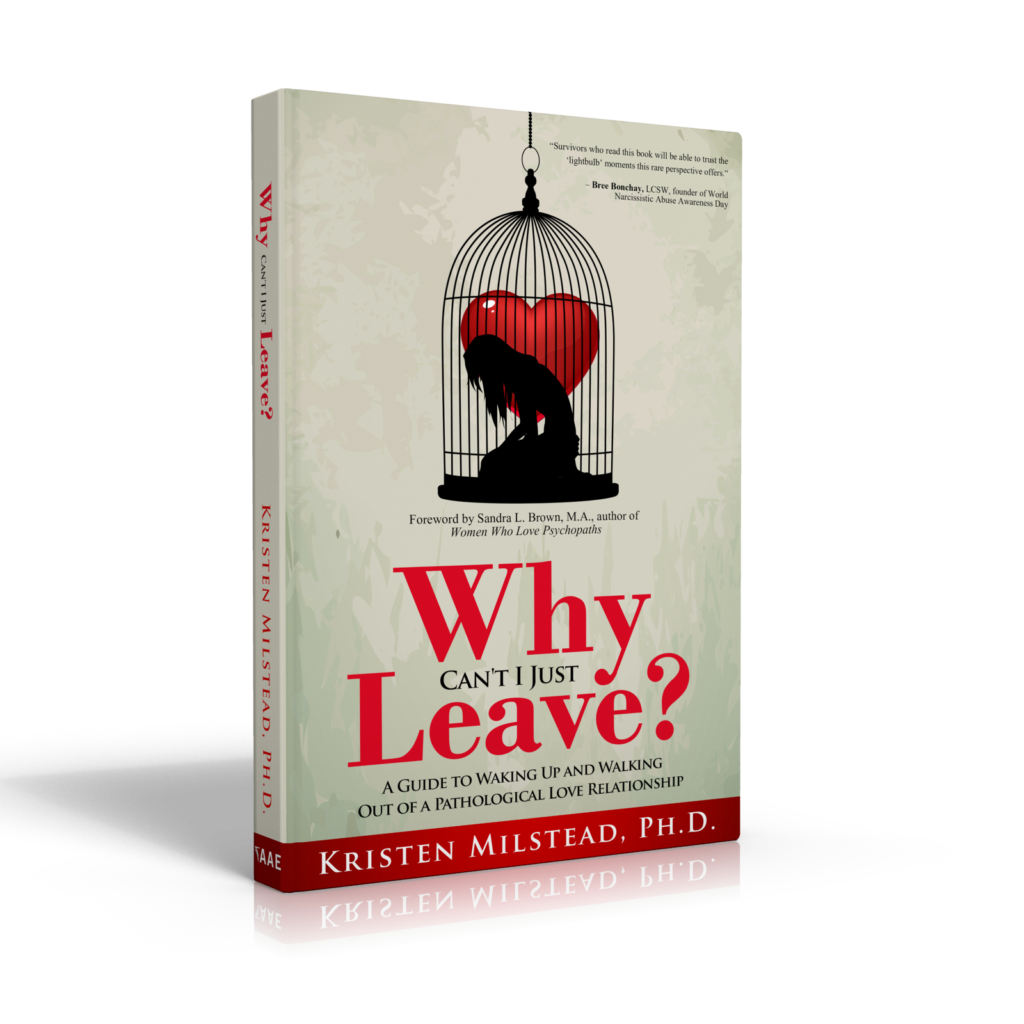One of the things that helped me the most in the aftermath of the long, strange, exhilarating, painful relationship I had with my ex-boyfriend was learning to think as he did.
It’s not easy and it’s not pretty, but it has been crucial in my recovery from the relationship.
At first, it made me literally physically sick and I rejected the reality of what I learned because it was too horrible to consider even when the truth of it was standing right in front of me screaming in my face and all I had to do was accept it.
Then, I rejected it because I couldn’t absorb it rationally for a variety of reasons.
And then, I did begin to accept it when I realized it was the only thing left that made sense. A part of me, however, still did not want to face this new reality.
Then, I stopped resisting and let the initial pain of what I learned scab over until I started to heal and see a future for myself in which everything was going to be okay.
It was the truth that began to set me free.
What Does It Mean to ‘Think Like a Narcissist?’
The way to understand what “thinking like a narcissist” means is to think about how when reading a novel, because of the way the author has crafted the words, you know what the main character is feeling and thinking to the point that you have such a deep comprehension of that character’s motivations that you could explain them to someone else.
Their actions make sense to you.
Note that “making sense” out of something doesn’t mean you like or agree with the character’s choices. Yet what it does mean is that everything in the book that the character does will be consistent within the context of the narrative. Nothing should stand out as being out of place.
The goal, therefore of “thinking like a narcissist” is to slip into their mind, to try to view the world from their eyes and understand what it is that motivates them to do the things that they do.
What Thinking Like a Narcissist is Not:
- Excusing their behavior or giving them a free pass. Just because you understand something or are willing to try doesn’t mean that people are absolved of their wrongdoing.
- Accepting pretty much anything the narcissist says and using it as a measure of how or what they think. Just as in novels, sometimes characters (or narrators) are unreliable, and you have to pay attention to other things beyond what they tell you to learn about who they really are.
- Reading about Narcissistic Personality Disorder. If we want to know what it is like to have cancer, we can read about the symptoms online or we can talk to someone who has it. Those are two different ways of knowing something, the former objective and the latter more subjective. In this case, the benefit to which I’m referring in this article of understanding how narcissists think comes from a subjective understanding from their own points of view, not the clinical scientific objective descriptions.
Why Thinking Like a Narcissist Is So Important
There are many different types of reading material to help us process narcissistic abuse. Most of the material is focused on the experience of and effects on the survivor, as it should be.
There is also a lot of material focused on describing the tactics that are perpetrated by the narcissists from a more objective perspective that helps us to recognize and put a name on the patterns of abuse we experience in these relationships and validate what we are going through.
All of this reading material can help us to get a sense of what the perpetrators look like in terms of their systematic behaviors, such as the cycle of abuse and what to expect.
What tends to be missing, however, is the why.
So, for example, why does a narcissist love-bomb a partner in the beginning of a relationship then over time begin to degrade, devalue and dehumanize the very same partner, and then intermittently switch back and forth between the two, seemingly moving back and forth between love and hate?
For a long time, it seemed I had one of two alternatives to understand the answer to this mind-boggling question (and others).
- Ask my ex-boyfriend.
- Accept the answer, “Because he is a narcissist.”
The first alternative was problematic because it gave him infinite opportunities to hoover me by promising to provide me with answers with why he did “this” or “that” or how I should give him the chance to explain something. By the end, he knew the one thing I needed from him the most was answers and it was the only reason I agreed to see him at all.
This alternative was also problematic because his answers were always unsatisfying. Even for just the scenario described above, how was he ever going to give me a satisfactory answer? A non-self-aware narcissist would not have the insight to know the answers I sought and a self-aware narcissist would not give me the answers if he had them.
My other alternative was just to accept that, well, he did it because he was a narcissist, but…
That’s like saying the sky is blue because that’s the color in the visible light spectrum we can see when we look at it. Okay, yes, obviously. But why?
I wanted to go deeper than just “because narcissists are evil” or “because narcissists like to hurt people.” Even if those were the reasons, which wanted to find out more about, I wanted to know why. What did they actually get out of it? What were they trying to accomplish, if hurting people was the goal?
For example, there were many moments that my boyfriend had been exceptionally kind and loving when it hadn’t been necessary and when he’d said loving things about me and hadn’t known it would get back to me, and those things didn’t make sense if only being cruel was the goal.
If I tried to pretend that those moments didn’t exist, then that puzzle I was trying to put together in my mind was going to keep coming back to haunt me as the pieces still weren’t going to fit together very well until I could at least try to explain that somehow.
I wanted to quiet my mind. I wanted to stop wondering why things had happened how they did once and for all.
The answer was that I had to think about the actual events that had happened in our relationship, the minute details, from his point of view.
How to Think Like a Narcissist
I found the writing of self-aware narcissists. There are two that I know of, each of which has very different styles, H.G. Tudor and Sam Vaknin.
Tudor writes first-person articles and books that describe exactly what he thinks and why and how it leads him to behave in certain situations. He covers all of the familiar tactics, such as love-bombing, triangulation, and hoovering, and discusses what causes narcissistic injury and why and why narcissists are so sensitive and why relationships with them won’t work out.
The catch is that he often describes them through romantic relationship scenarios, going through exactly what he is thinking as he does the cruel or manipulative things that he does.
Vaknin is more academic in his approach than Tudor, objectively describing how and why narcissists approach relationships as they do in a very cold, objective manner, but very clearly explaining what motivates them.
There are other authors who do a good job of describing this as well, authors such as Elinor Greenberg and J.H. Simon. Greenberg is a psychologist who specializes in treating narcissists but has a very clear way of describing their intentions and motivations. Simon also has a fresh take on what drives narcissists to behave as they do.
Any of these authors can assist with this understanding, and, in fact, reading a variety of perspectives and authors will likely give the fullest picture.
Why Thinking Like a Narcissist Is So Hard to Do
Although it seems obvious that we may want to put ourselves in their shoes in order to understand why they do what they do, consider how non-obvious the rationality for their behavior is to us, and it becomes apparent why we have to make a conscious effort to do this or to even think to do it.
In the example of reading a novel and understanding a character’s motivations, this stands in complete opposition to our relationship with the narcissist, in which their behavior is rife with inconsistency and the entire narrative of the relationship is nonsensical, and we are left with the inability even to explain to ourselves, much less anyone else, what has happened.
The disconnect is that narcissists are not operating from the same mindset from which neurotypicals engage with the world. Yet we know that they are not psychotic and we must assume they are rational actors at least to themselves, so as we puzzle over why their behavior oscillates between love and hate (or other things that they do), we must understand what it is that motivates them and what they want to accomplish in order to determine why this happens.
This is the first reason why thinking like a narcissist is so difficult to do: it doesn’t come naturally. If it did, we wouldn’t be so puzzled about their behavior in the first place.
The second reason why is because it is harsh and painful. For example, reading that, in the mind of a narcissist, something that meant so much to us meant so little to them can be brutal. To read it in the cold manner written by the narcissists Tudor or Vaknin can be especially painful, as they do not sugar-coat the information, and, in the case of Tudor, they write directly from the perspective of a narcissist who is perpetrating abuse on someone and it is like listening to their thoughts as they do the things that were done to us that hurt us so much.
Even if the goal is to show others how and why the narcissist is being abusive, the candid dehumanization of us and our emotions, although it is symbolically represented in these writings, can feel at first as if it is simulating the trauma we have already endured.
I hold the belief, however, that the temporary pain is worth the final outcome.
Why Thinking Like a Narcissist Sets Us Free
It comes down to a choice between holding onto pretty lies and half-truths, which keep us positioned to be emotionally bled dry by the narcissist, or if the relationship has ended, keep us tied to the narcissist in a way that makes it impossible to recover, or temporarily exposing ourselves to painful ideas to gain freedom.
The good news is that the exposure to “thinking like a narcissist” can be done at our own pace.
Small doses can have a large effect and over time, these accumulate to start to sink in to retrain our minds and undo the brainwashing that the narcissist has implanted about his or her intentions.
The important thing to remember is that no one can truly ever get into anyone’s mind and know everything that they intended and some people may try to convince you that you are wrong for trying to impute intentions to others’ behavior.
My response to this is that we already do this in our interactions with everyone we meet every day. We are always negotiating and sizing up what people intend in order to determine how to respond back to them, for example, in order to figure out who is “in charge” in certain environments, in order to determine what kind of mood someone is in, in order to determine whether someone is safe to engage with or not, and many other constant calculations we do both consciously and subconsciously that we aren’t even aware of. Sometimes we get it wrong, but it’s a necessary part of life.
The problem is that, with narcissists, so much of what they do is irrational, contradictory, destructive and has gone against the social and relationship norms that we have encountered, that it is normal for us to seek answers.
Seeking the answers as I write about it here is not for the sake of confronting them or exposing them. It is for the sake of putting our minds at ease as part of the closure we need to move on.
We don’t need to contact them and ask for validation of what we learn. We don’t have to get every piece right. We may have to read a few things about what narcissists in general think before we understand what the narcissist we were with was likely thinking.
But once things start to click into place, the benefit is that we start to understand that this is something that was much bigger than us and anything we ever did within the relationship with them. It is also much bigger than anything they ever said to us about who they wanted us to believe we were.
We slowly start to let go of the chains they bound us with– both the ones that felt so good to hold onto, and the ones that they had clamped around our throats.
The freedom of being able to breathe is well worth the pain of letting go.
Where to access the work of H.G. Tudor and Sam Vaknin.
- H.G. Tudor: Youtube Channel Amazon Author Page
- Sam Vaknin: Website Youtube Channel Amazon Author Page






8 Comments
Julie Guldagger
I get so upset whenever we write about these men/women. I do feel a load, a big load of hate towards my ex – the leech (as my therapist told me to call him), but it seems like we all just easily start hating on them as if they are pure evil, when the fact of the matter is that they have a personality dissorder… None treatable that is for sure… But still, they have a very little cue of what they do to people along their way, cause they are damaged from childhood… They say therapy isnt possible for these types?? That is sad. Im never going back to my ex, but i do f…ing hope he will find peace some day and fix his childhood trauma <3 Julie
Kristen Milstead
Hi Julie: I don’t see any comments in this article hating on narcissists. In any case, I don’t believe survivors should have to remain silent just because their abusers have a personality disorder. Yet wishing someone peace while at the same time stating facts about the damage they caused you are not mutually exclusive. I think it’s possible tell your truth about the trauma you’ve been through because of narcissistic abuse *and* to hope that the abusers can find peace from their own personality disorders. Thank you for your comment. -Kristen
C
So true, Kristin. Thank you for another great piece on narcissism! I delved into Tudor’s world with curiosity and fear, and though I felt somewhat retraumatized by some of his incredibly candid, descriptive pieces…they ultimately liberated me from the confusion and cognitive dissonance that kept me chained to hope, the past and the perpetrator.
It’s hard to accept complete insincerity and a lack of empathy from the person who meant so much to me at one point, but it’s also one needs to fully move on with no contact.
Mary Beth Marlar
Hi, I’d like to read this information from Tudor that you mention. Where can I find that particular information that youve read?
C
So true, Kristin. Thank you for another great piece on narcissism! I delved into Tudor’s world with curiosity and fear, and though I felt somewhat retraumatized by some of his incredibly candid, descriptive pieces…they ultimately liberated me from the confusion and cognitive dissonance that kept me chained to hope, the past and the perpetrator.
It’s hard to accept complete insincerity and a lack of empathy from the person who meant so much to me at one point, but it’s also one needs to fully move on with no contact.
Mary Beth Marlar
Hi, I’d like to read this information from Tudor that you mention. Where can I find that particular information that youve read?
Kristen Milstead
Hi Mary Beth: I put a link to his author page on Amazon in the article. He’s written several dozen books. I’ll also edit the article right now with links to other sources where you can access his material. Thank you for taking the time to leave a comment. -Kristen
Kristen Milstead
Hello C, I’m so glad you enjoyed the article, and that you were also able to find some peace and hope through gaining a better understanding of the narcissist’s point of view. I agree it is traumatizing and painful at first and hard to accept, but liberating. Thank you for reading and for taking the time to share your thoughts. -Kristen